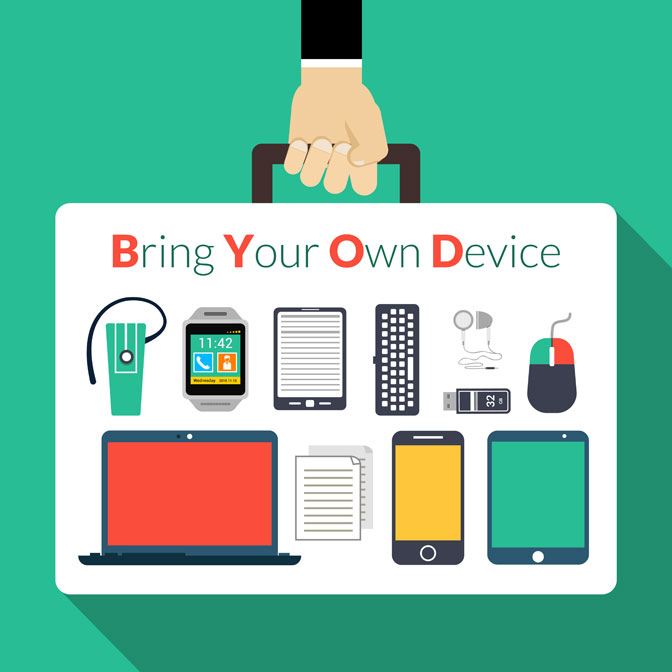It’s safe to say that pretty much everyone in the professional world carries some sort of mobile device these days. And with the proliferation of tablets, laptops, smartphones comes a new trend in the workplace: BYOD, or Bring Your Own Device. With many companies already implementing BYOD policies across multiple fields, the trend is catching on quickly, but is it right for your business? If you’re unsure about introducing BYOD at your company, here are a few things to consider:
Tech cost savings
The amount of money your company will save alone might be enough incentive to start your own BYOD policy. Think about it: if you no longer have to foot the bill for your employees’ work computers/tablets/mobile devices, the savings will be huge right off the bat. According to Gartner, IT leaders can spend half a million dollars to buy and support 1,000 enterprise-owned tablets, while they can support 2,745 user-owned tablets with that same budget. In addition, without a stipend, direct costs of user-owned tablets are 64% lower.
Enhanced productivity
When you’re a lifelong PC user, being handed an IT issued Mac is like being asked to learn a whole new language. A BYOD policy allows your employees to work on a device they are already intimately familiar with, meaning you don’t have to deal with the frustration and lag-time of employees struggling to figure out a new system every time they come to work.
Enhanced worker satisfaction
When you’re employees have the freedom and comfort of working on a device they already know and love, they tend to enjoy work a bit more which translates into a happier, more productive work environment.
More up-to-date
Devices go out of date at blinding speed, but when employees use work-issued devices, they have little incentive to upgrade. More often than not, an employee’s personal device is more current than their work device, so merging the two will help to ensure that your company stays on the cutting edge.
Less IT time
BYOD means that the burden of tech maintenance falls mainly on the employee, rather than the company. This means a lighter load on your IT department, as well as the company coffers.
Recruitment
The top talent is increasingly drawn to companies that offer flexibility. This means that things like flexible schedules, remote work opportunities and BYOD policies can help you reel in some desirable employees while saving you money in the process.
More engagement
When employees are issued a work-specific device from IT, they are more likely to treat it as an extension of the office. Which means, when the work day is done, they forget about their work-issued computer or tablet. But if their personal device and work device are one and the same, they are much more likely to stay engaged and be more responsive while away from the office.
Access to content
Many companies are put off by BYOD because of concerns about content and data security. But these concerns are easily overcome with the implementation of a good Enterprise Content Management (ECM) strategy. ECM ensures that your data remains centralized in one secure system, regardless of the device being used. It also includes security features like password protection for multiple levels of access, and access tracking which ensures that any time a file is accessed, edited or shared it will be automatically tracked and recorded.
While concerns about security are certainly understandable, the BYOD trend seems all but unstoppable, and as long as you are careful about how you implement BYOD in your office, the benefits clearly outweigh the risks. The key is to be clear about company protocol regarding personal devices. Make sure your employees are well informed about how to handle company data and content and what they can and cannot access or share from their personal devices. As long as you are proactive and thoughtful about your BYOD policy, you’ll be looking at a more relaxed, more productive and more profitable workplace.


